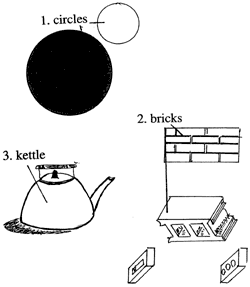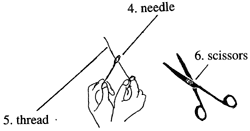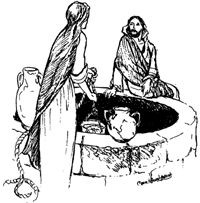Unit 33: The Possessive
Pictured Words

| 1.circles
|
| 2.bricks
|
| 3.kettle
|

| 4.needle
|
| 5.thread
|
| 6.scissors
|
New Words
Nouns
Adjectives
Sayings
My purpose is to make good use of my needle and my thread of cotton.
Her scissors will be on the tray over there.
You have a knot in your line.
Theirs is a simple sport.
Their club meets in a circle at the hearing of the bell.
That kettle is mine, and the glass is also mine.
The hot water from his kettle is being put into the basin.
Our engines are old and useless now.
Ours is a well managed industry.
The Possessive
The idea of ownership by a person is said in a special way in English.
There are two forms, the pronoun and the adjective:
| Adjective
| Pronoun
|
| my
| mine
|
| your
| yours
|
| his
| his
|
| her
| hers
|
| our
| ours
|
| their
| theirs
|
if I may only put my hand on his robe.
my child, I say to you, Get up.
a friend of mine has come to me.
wise design and good sense are mine.
your brother will come to life again.
your faith has made you well.
sons and daughters, but they will not be yours.
he came into his country.
only to put his hands on one or two persons who were ill.
said secretly to her sister.
took her seat at the Lord's feet.
hanging our instruments of music.
Lazarus our friend is at rest.
will not their cattle and all their beasts be ours?
take their bread with unwashed hands.
took on their beds those who were ill.
you will have no need of theirs.

A Woman By The Well
So he came to a town of Samaria which was named Sychar, near to the bit of land which Jacob gave to his son Joseph:
Now Jacob's well was there.
Jesus, being tired after his journey, was resting by the well.
It was about the sixth hour.
A woman of Samaria came to get water, and Jesus said to her, Give me some water.
For his disciples had gone to the town to get food.
The woman of Samaria said to him, Why do you, a Jew, make a request for water to me, a woman of Samaria?
She said this because Jews have nothing to do with the people of Samaria.
In answer Jesus said, If you had knowledge of what God gives freely and who it is who says to you, Give me water, you would make your prayer to him, and he would give you living water.
The woman said to him, Sir, you have no vessel and the well is deep;
from where will you get the living water?
Are you greater than our father Jacob who gave us the well and took the water of it himself, with his children and his cattle?
Jesus said to her, Everyone who takes this water will be in need of it again:
But whoever takes the water I give him will never be in need of drink again;
for the water I give him will become in him a well of eternal life.
The woman said to him, Sir, give me this water, so that I may not be in need again of drink and will not have to come all this way for it.
Jesus said to her, Go, get your husband and come back here with him.
In answer, the woman said, I have no husband.
Jesus said to her, You have said rightly, I have no husband:
You have had five husbands, and the man you have now is not your husband: that was truly said.
Additional Reading
The word "well" in this story is not the opposite of "ill".
It means a deep hole in the ground for getting water by letting a bucket down into it on a cord.
There was a long history to Jacob's well.
Have in mind that the country of Palestine is a very dry land.
So, this well was important to everyone there.
It was a very deep hole into which water slowly kept coming.
It was not a spring of water.
To get water from it, every person let his bucket down into it, and this was usually a leather bucket made from the skin of some animal.
There is a true story about a woman who came down the hill to this well.
She had her water pot with her, and she put water in it by undoing the cord of her leather bucket and letting it down into the well.
She then got it up again and let the water go into her water pot.
She kept on doing this until her pot was full.
Keep in mind that this well was over 33 M deep, so it was a lot of work to get that water.
When she had gone away a man came to the well and was in need of a drink.
But, he did not have a leather bucket.
He took a long look down into the well, but had to be comforted by only putting his lips to the wet stones around the well.
Without a bucket that was all the drink he could get.
So, we can easily see the point of the woman's question to Jesus, "Sir, you have no vessel and the well is deep;
from where will you get the living water?"
Then she said to Jesus: "Are you greater than our father Jacob who gave us the well and took the water of it himself, with his children and his cattle?"
She had in mind that anyone who gave better water than Father Jacob was making a false statement.
Also, he was a Jew, and there was an argument between the Jews and the Samaritans that had gone on for over 400 years.
It was a very bitter argument.
It was about their religion and where they should make offerings to God.
So, quite naturally, such a statement from a Jew would seem to her to be false.
Then, this Jew was not doing the right things.
He was making a short journey through Samaria instead of going the long way round to get away from the hated Samaritans.
He was stopping on the way, and he was talking to a woman.
Now, a good Jew would never say anything to a woman in public, not even to one of his close relations.
There was even a group of Jews who kept their eyes shut whenever they saw a woman, and they had the name, the broken bleeding ones, because they often went into walls, whilst their eyes were shut.
So, Jesus did not keep to the usual ways when he made his request to this woman for a drink.
And what a woman she was.
She had already been married to five husbands!
It is quite likely that the long trip she was making in the middle of the day was because she had a sense of shame.
There was, in fact, a well that was much closer: right in the town itself.
Maybe she was not thought of kindly there and had no respect in the society of the other women.
So it was quite a wise observation to her that this Jew was not the usual sort.
Now, living water has a special meaning in the East.
Some say that its meaning is running water.
Others go further and say living water is spring water.
It may be that the idea is different in different places.
But, the fact remains that when on a journey in a desert area, water is most important.
And there are all kinds of it.
Sometimes the salts in the water make a person sick and sometimes the water is dirty and smelly, with even dead animals in it.
But on a journey in a desert one has to take a drink whatever the water is like.
So, living water was very special.
It was always clean, clear and good for drinking.
Religious acts were often done beside springs of this living water because of its importance when on a journey.
Jesus made an offer to this woman that was of special meaning to her.
She would easily get its meaning because there were many teachings in her society which said that good religion is like living water.
Helpful Notes
| sixth hour
| midday, noon measure of time was from morning then.
|
| well of eternal life
| a life support lasting forever.
|
| leather bucket
| a small leather vessel used at wells in those parts.
|
| father Jacob
| many different groups look to Jacob as their father.
|
| the long way round
| walking further in keeping clear of the place.
|
| sense of shame
| a feeling of bad relations with others.
|
Interesting Facts and Records
The Tent of Meeting
We should always have in mind that Moses was a grown man of 40 years when he left Egypt the first time.
He had learned great knowledge and skills.
It is natural that he put them into good use when he became leader and manager of the Exodus.
You may have seen the television picture, "The Ten Commandments".
Moses is there seen to have been both a ruler and a leader in war.
In the Scriptures, he gives many examples of his skill on the field of battle.
Battle in Egypt was given by directions from a distance with the horn.
Moses did the same for his fighting men.
He stood on a hill and used his arms to give directions.
War was no sport and Moses had learned the skills needed.
He gave training to an army of brick makers and knotted them together into a skilled fighting club.
This same ability to get profit from his experiences in Egypt can be seen in the Tent of Meeting.
The plan God gave Moses on the Mount was no patent for future church buildings.
But it was a very sensible structure.
In many ways it had the qualities of a temple in Egypt.
But it could be transported by men through that dry, dusty place.
It needed no engines for its pulling.
There was no cotton cloth to work with.
But there were goat skins and flax.
There were also many women to use their needles, and many men to get trees and work with metals.
When Moses was on "Mount Sinai" with smoke and flaming lava bursting from its pipes, God gave him the inspiration he needed for this great structure.
The posts stood in brass bases.
The walls were bright with a skin of gold from base to top.
It was clearer than glass.
The roof was bright with holy pictures in many colors.
Blue, red, brown and grey were beautifully joined together.
As the winds came over this roof it would be moved up and down giving a sense of soft pleasure.
All the trays, kettles, basins, spoons and scissors were made of gold.
They seemed as bright as stars.
As the roof moved and the wax in the lights burned, the shadows came and went.
The fine gold wire in the priest's clothes gave back a bright light.
It was a view without equal.
When the Tent of Meeting went in transport with the priests blowing their horns and with bells ringing, the sun seemed to light up the golden Ark.
With it went its army of fighting men.